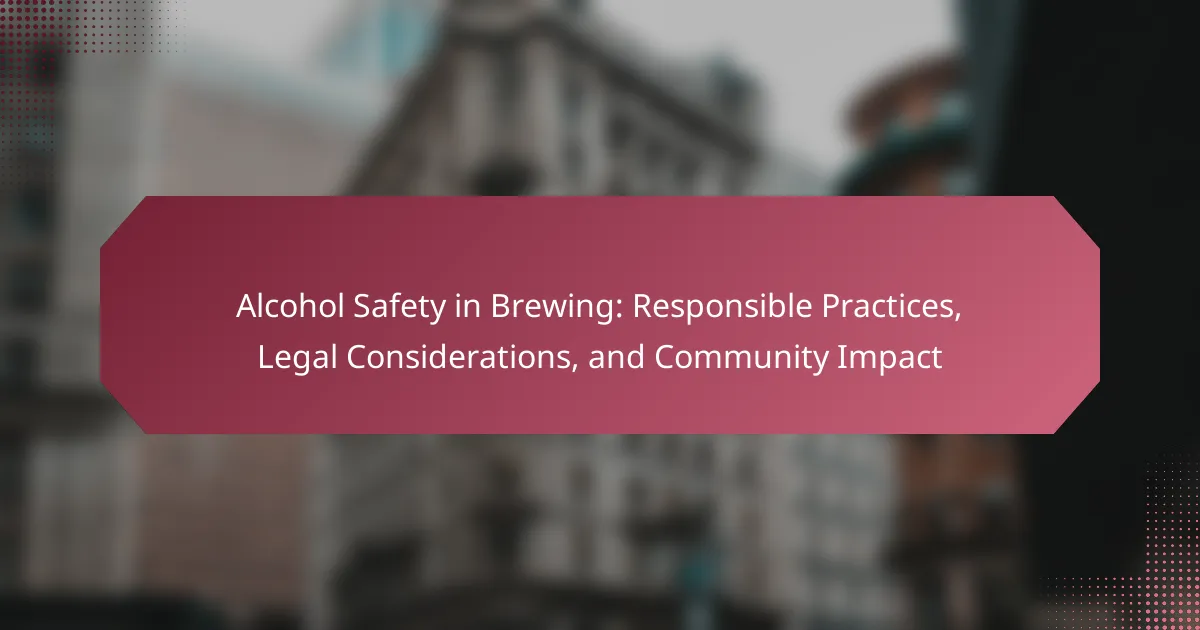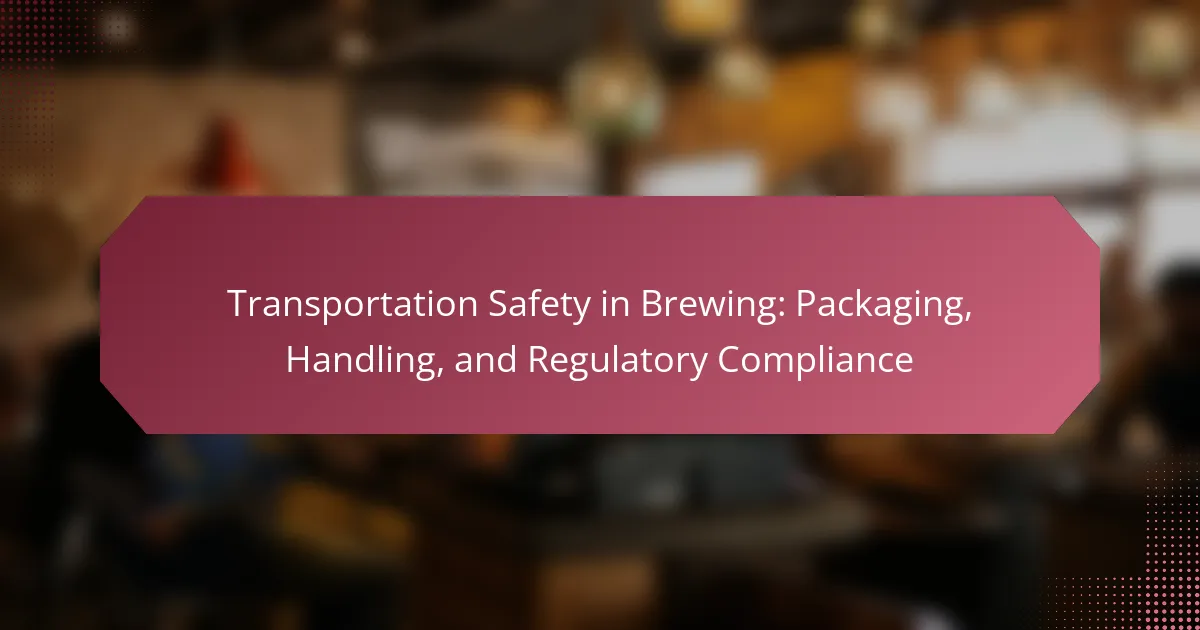Alcohol safety in brewing encompasses the practices and measures essential for the safe production and consumption of alcoholic beverages. This includes compliance with legal regulations on alcohol content, labeling, and obtaining necessary licenses, such as the Brewer’s Notice from the Alcohol and Tobacco Tax and Trade Bureau (TTB). The article addresses the importance of implementing safety protocols during the brewing process, staff training, and monitoring fermentation to ensure product quality. Additionally, it explores the economic benefits of brewing for local communities, such as job creation and support for local agriculture, while also acknowledging potential social challenges, including alcohol dependency and public health concerns. Overall, the discussion emphasizes the balance between responsible brewing practices and community impact.
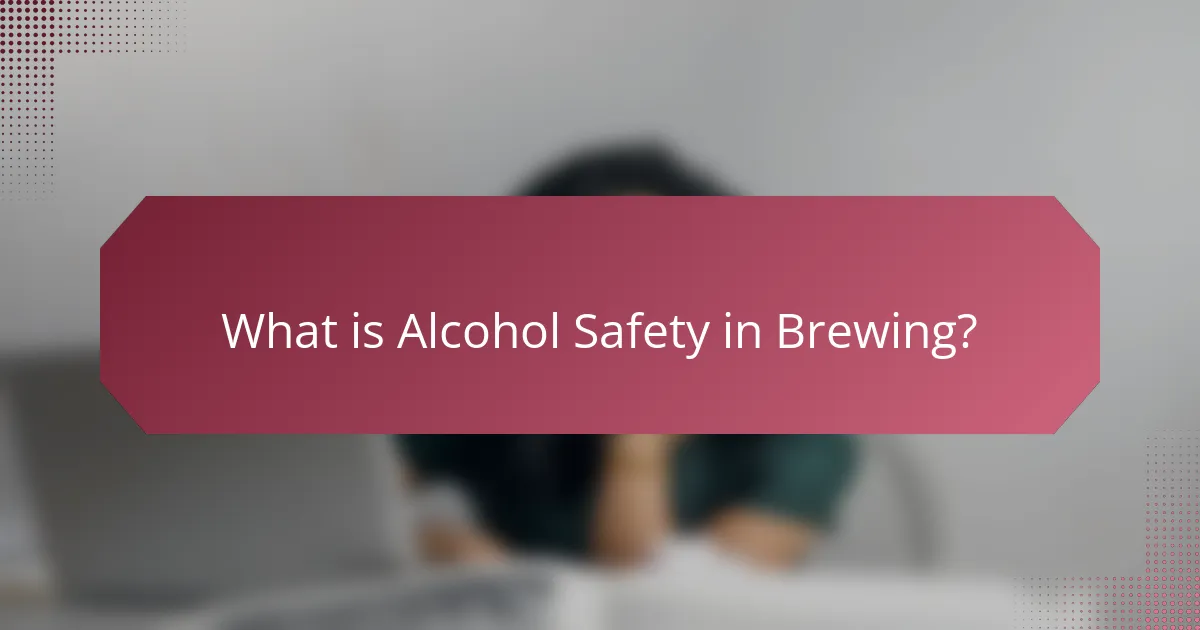
What is Alcohol Safety in Brewing?
Alcohol safety in brewing refers to the practices and measures taken to ensure the safe production and consumption of alcoholic beverages. This includes adhering to legal regulations regarding alcohol content and labeling. It also involves implementing safety protocols to prevent accidents during the brewing process. Proper training for staff on handling equipment and ingredients is crucial. Additionally, monitoring the fermentation process helps maintain quality and safety. Following these practices reduces the risk of producing unsafe products. Compliance with local laws ensures that brewers operate within legal limits, promoting public health and safety.
How does Alcohol Safety impact the brewing process?
Alcohol safety impacts the brewing process by ensuring compliance with legal regulations and promoting responsible consumption. Adhering to safety standards prevents underage drinking and excessive consumption. Breweries must implement quality control measures to maintain product integrity. This includes monitoring alcohol content and ensuring proper labeling. Safe brewing practices also protect workers and consumers from potential hazards. Additionally, responsible brewing fosters community trust and supports sustainable business practices. Studies show that breweries prioritizing safety see improved public perception and customer loyalty.
What are the key practices for ensuring safety in brewing?
Key practices for ensuring safety in brewing include maintaining cleanliness, monitoring temperatures, and using appropriate personal protective equipment (PPE). Cleanliness prevents contamination, which can lead to unsafe products. Monitoring temperatures ensures that fermentation occurs within safe ranges, reducing the risk of spoilage. PPE, such as gloves and goggles, protects brewers from chemical exposure and physical hazards. Additionally, proper storage of ingredients and finished products minimizes risks associated with spoilage and accidents. Regular equipment maintenance helps prevent malfunctions that could lead to safety issues. Following these practices contributes to a safe brewing environment.
How does fermentation affect alcohol safety?
Fermentation affects alcohol safety by producing ethanol and carbon dioxide while inhibiting harmful bacteria. During fermentation, yeast converts sugars into alcohol, creating a safe environment for consumption. This process can lower pH levels, making it difficult for pathogens to survive. Additionally, proper fermentation temperatures and durations are crucial for reducing the risk of toxic byproducts. For example, temperatures above 60°F can lead to unwanted bacterial growth. Research indicates that controlled fermentation processes significantly reduce the presence of harmful microorganisms. Therefore, effective fermentation is essential for ensuring the safety of alcoholic beverages.
Why is responsible brewing important?
Responsible brewing is important to ensure the safety and well-being of consumers. It helps prevent alcohol abuse and promotes moderate consumption. Responsible brewing practices also adhere to legal regulations, reducing the risk of fines and legal consequences. Furthermore, these practices foster a positive community impact by supporting local economies and promoting safe social environments. Studies show that responsible alcohol production can decrease incidents of alcohol-related harm. By prioritizing responsibility, brewers contribute to public health and enhance their brand reputation.
What are the consequences of irresponsible brewing practices?
Irresponsible brewing practices can lead to serious consequences. These include contamination of the final product, which can pose health risks to consumers. Poor sanitation can result in off-flavors and spoilage. Additionally, improper fermentation can create harmful byproducts, such as methanol. Legal repercussions may arise from failing to comply with safety regulations. This can lead to fines or closure of the brewing operation. Community trust may also be eroded due to negative public perception. Ultimately, irresponsible practices can damage the reputation of the brewery and the broader industry.
How can brewers promote responsible consumption among consumers?
Brewers can promote responsible consumption among consumers by implementing educational campaigns. These campaigns can inform consumers about the effects of alcohol and encourage moderation. Brewers can also provide clear labeling on their products, indicating alcohol content. This transparency helps consumers make informed choices. Additionally, hosting community events focused on responsible drinking can foster a culture of moderation. Research shows that informed consumers are more likely to drink responsibly. According to a study by the National Institute on Alcohol Abuse and Alcoholism, education significantly reduces risky drinking behaviors. By combining education, transparency, and community engagement, brewers can effectively promote responsible consumption.
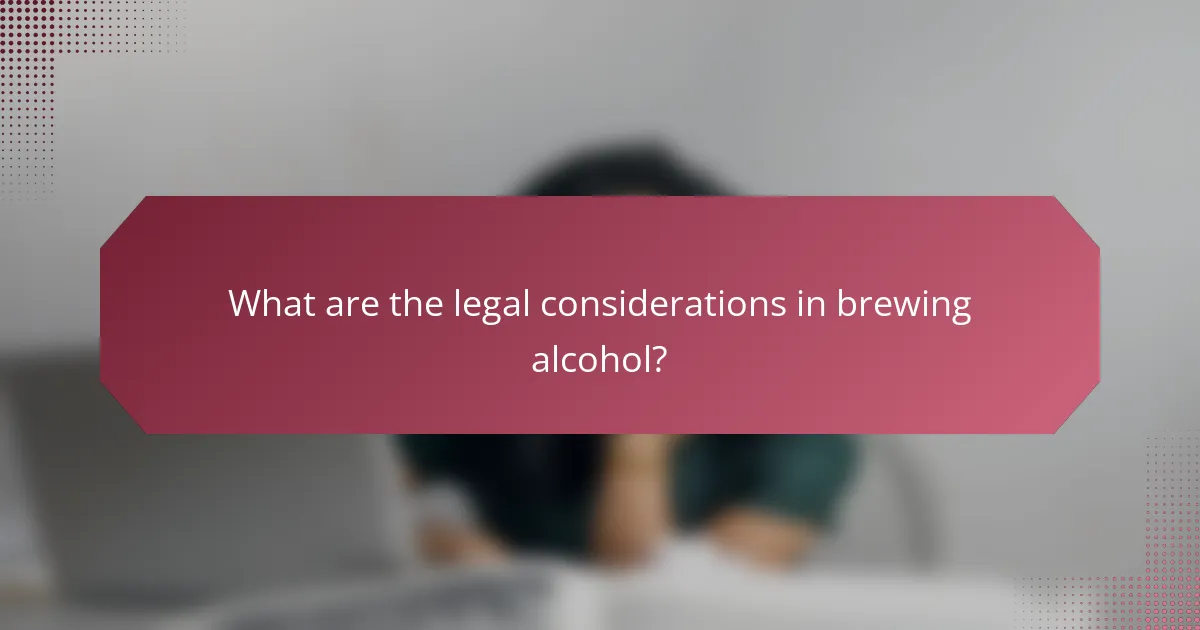
What are the legal considerations in brewing alcohol?
Legal considerations in brewing alcohol include obtaining necessary licenses and permits. In the United States, federal law requires a brewer to have a Brewer’s Notice from the Alcohol and Tobacco Tax and Trade Bureau (TTB). Additionally, state and local regulations may impose further licensing requirements. Compliance with health and safety regulations is essential to ensure safe production practices. Labeling requirements dictate that all alcoholic beverages must have accurate labels that include alcohol content and health warnings. Taxes on alcohol production and sales must be paid according to federal and state laws. Failure to comply with these regulations can result in fines or shutdowns.
What laws govern alcohol production and sale?
Alcohol production and sale are governed by a variety of laws at federal, state, and local levels. The primary federal law regulating alcohol is the 21st Amendment, which repealed Prohibition and allowed states to control alcohol distribution. The Alcohol and Tobacco Tax and Trade Bureau (TTB) oversees federal regulations, including licensing and taxation. Each state has its own laws regarding the production, distribution, and sale of alcohol. These laws can dictate age restrictions, hours of sale, and types of permits required. Local municipalities may also impose additional regulations. Compliance with these laws is crucial for businesses involved in alcohol production and sale. Violations can result in fines, license revocation, or criminal charges.
How do licensing requirements vary by region?
Licensing requirements for alcohol vary significantly by region. In the United States, each state has its own regulations governing alcohol licensing. For example, California requires a series of permits for breweries, including a state license and federal permits. In contrast, Texas has more streamlined processes but also imposes specific local regulations.
In Europe, countries like Germany have strict licensing laws that include health inspections and safety regulations. Meanwhile, the UK requires a premises license and personal license for responsible alcohol service.
These variations reflect local cultural attitudes towards alcohol, public safety concerns, and historical contexts. Regions with higher alcohol consumption may have more stringent licensing to mitigate risks. Conversely, areas with a strong brewing tradition may have more lenient requirements to promote local businesses.
What are the penalties for non-compliance with alcohol laws?
Penalties for non-compliance with alcohol laws can include fines, license suspension, and criminal charges. Fines can range from hundreds to thousands of dollars, depending on the severity of the violation. License suspension may last from a few days to several years. In some cases, repeat offenders face harsher penalties, including jail time. Criminal charges can lead to misdemeanor or felony convictions. These consequences aim to enforce responsible alcohol distribution and consumption. Compliance with laws is essential for public safety and community welfare.
How do regulations ensure consumer safety?
Regulations ensure consumer safety by establishing standards for product quality and safety. These regulations require manufacturers to adhere to specific guidelines during production. Compliance with these standards minimizes risks associated with harmful substances. For instance, regulations may limit alcohol content and mandate ingredient disclosures. Agencies like the FDA and TTB enforce these regulations in the alcohol industry. Regular inspections and testing help maintain adherence to safety protocols. Violations can result in penalties or product recalls, protecting consumers from unsafe products. Historical data shows that regulated industries have lower rates of consumer harm compared to unregulated ones.
What role do health inspections play in brewing safety?
Health inspections play a critical role in brewing safety by ensuring compliance with health regulations. These inspections assess sanitation practices, equipment cleanliness, and ingredient safety. Regular health inspections help identify potential hazards in the brewing process. They also verify that breweries follow proper fermentation and storage procedures. In the United States, the FDA and local health departments conduct these inspections. Compliance with health standards reduces the risk of contamination and foodborne illnesses. Studies show that breweries with regular inspections have lower rates of safety violations. This oversight ultimately protects consumers and promotes public health.
How can brewers stay updated on changing regulations?
Brewers can stay updated on changing regulations by regularly consulting government websites and industry associations. These sources provide the latest legal updates and compliance information. Joining professional organizations, such as the Brewers Association, offers access to resources and networking opportunities. Attending industry conferences and workshops allows brewers to learn directly from experts about regulatory changes. Subscribing to industry newsletters keeps brewers informed about news and updates. Engaging with local regulatory bodies can provide specific guidance on state and local laws. Utilizing social media platforms can also help brewers follow discussions on regulatory issues. Regularly reviewing legal publications ensures awareness of significant regulatory developments.
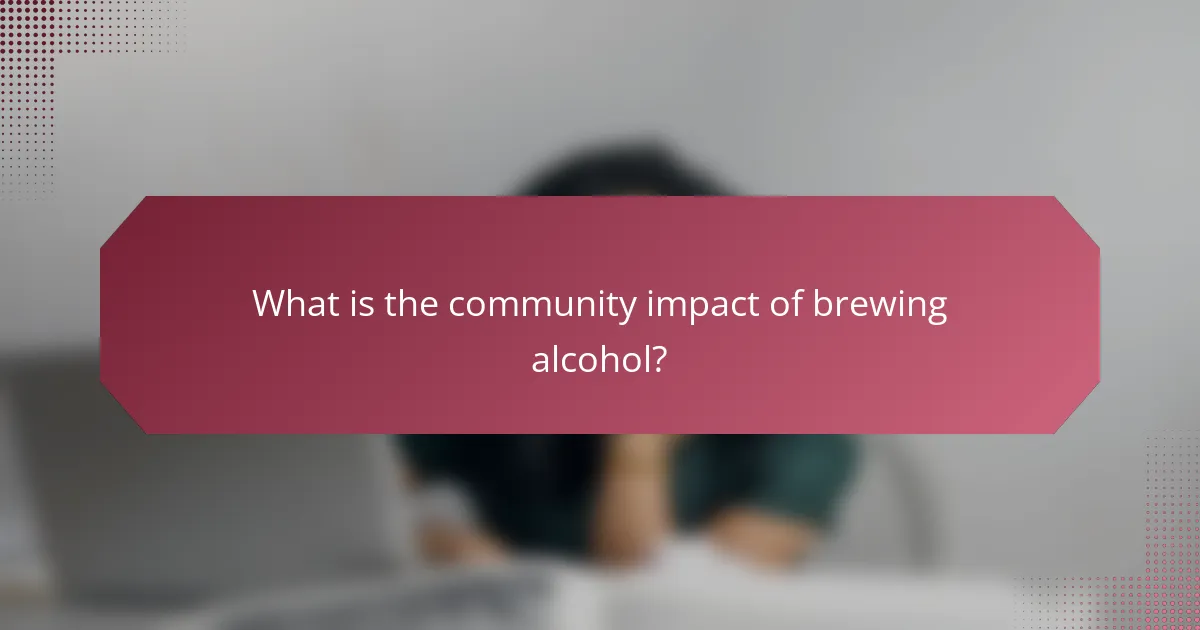
What is the community impact of brewing alcohol?
Brewing alcohol can significantly impact communities in various ways. It can create job opportunities, supporting local economies. Breweries often source ingredients from local farmers, promoting agricultural sustainability. Alcohol production can also foster community engagement through events and social gatherings. However, it may lead to negative social issues, such as alcohol dependency and public health concerns. Studies indicate that increased alcohol availability correlates with higher rates of alcohol-related incidents. Responsible brewing practices and community awareness can mitigate these negative effects. Overall, the community impact of brewing alcohol is multifaceted, involving both economic benefits and social challenges.
How does brewing contribute to local economies?
Brewing contributes to local economies by creating jobs and generating tax revenue. Local breweries employ a significant number of workers, from production staff to sales and marketing teams. According to the Brewers Association, the craft brewing industry supported over 1.4 million jobs in the U.S. in 2022. Additionally, breweries often source ingredients locally, benefiting local farmers and suppliers. This practice stimulates agricultural sectors and promotes regional economic growth. Furthermore, breweries attract tourism, with many consumers visiting for tastings and tours. This influx of visitors boosts spending in nearby restaurants, hotels, and shops, further enhancing the local economy.
What jobs are created through the brewing industry?
The brewing industry creates a variety of jobs. These include positions in brewing, packaging, and distribution. Breweries employ brewers who are responsible for the production process. Quality control technicians ensure the product meets safety standards. Sales and marketing professionals promote the brand and products. Additionally, there are roles in supply chain management and logistics. The industry also supports jobs in agriculture, particularly in hop and barley farming. According to the Brewers Association, the craft brewing sector alone supports over 1.2 million jobs in the United States.
How do breweries engage with their communities?
Breweries engage with their communities through various initiatives and events. They often host local events such as beer tastings and festivals. These events promote local culture and foster community spirit. Breweries frequently collaborate with local businesses and artisans. This collaboration supports the local economy and strengthens community ties. Many breweries also participate in charitable events. They donate a portion of their sales to local causes and non-profits. This philanthropy enhances their community presence and builds goodwill. Additionally, breweries may offer educational workshops about brewing and responsible drinking. These efforts help raise awareness and promote safe consumption practices.
What are the social responsibilities of breweries?
Breweries have several social responsibilities. They must promote responsible drinking among consumers. This includes providing information about alcohol content and its effects. Breweries should also implement age verification measures to prevent underage drinking. Many breweries engage in community outreach programs. These programs often focus on alcohol education and prevention. Additionally, breweries can support local economies by sourcing ingredients locally. They can also participate in environmental sustainability efforts. This includes reducing waste and conserving water. Studies show that responsible practices can enhance a brewery’s reputation and customer loyalty.
How can breweries promote safe drinking habits?
Breweries can promote safe drinking habits by implementing educational programs. These programs can inform customers about responsible drinking. Breweries can provide information on standard drink sizes and alcohol content. They can also encourage moderation through promotional campaigns. Offering non-alcoholic beverage options is another effective strategy. Many breweries host events that promote safe transportation options. Collaborations with local transportation services can help reduce drunk driving. Research shows that responsible drinking initiatives can lower alcohol-related incidents.
What initiatives can breweries take to reduce negative impacts on the community?
Breweries can implement several initiatives to reduce negative impacts on the community. They can promote responsible drinking by providing educational programs. These programs can inform patrons about alcohol consumption and its effects. Breweries can also support local charities through fundraising events. This fosters community engagement and contributes to local needs. Additionally, they can collaborate with local law enforcement to ensure safe transportation options for patrons. Offering discounts for designated drivers is another effective strategy. Furthermore, breweries can adopt sustainable practices, such as reducing waste and conserving water. These actions not only benefit the environment but also enhance community well-being.
What best practices can brewers adopt for alcohol safety?
Brewers can adopt several best practices for alcohol safety. First, they should implement strict age verification processes to prevent underage drinking. This includes checking IDs at the point of sale and during events. Second, providing clear information about alcohol content and serving sizes is essential. This helps consumers make informed choices. Third, brewers should promote responsible drinking through campaigns and partnerships with local organizations.
Additionally, offering non-alcoholic options can encourage moderation. Regular staff training on alcohol safety and responsible service is crucial. This ensures employees understand the importance of monitoring consumption. Finally, brewers should establish a clear policy for handling intoxicated customers. This may involve training staff to recognize signs of intoxication and having a plan for safe transportation options. Implementing these practices can significantly enhance alcohol safety in brewing.
How can brewers implement effective training programs for staff?
Brewers can implement effective training programs for staff by developing a structured curriculum that covers essential topics. This curriculum should include alcohol safety, responsible serving practices, and legal compliance. Training sessions should be interactive and incorporate hands-on activities to engage staff. Regular refresher courses should be scheduled to keep knowledge current. Utilizing experienced trainers can enhance the program’s effectiveness. Assessment tools, such as quizzes or practical evaluations, can measure staff understanding. According to the National Restaurant Association, effective training can lead to a 10-20% reduction in alcohol-related incidents. This evidence supports the implementation of comprehensive training programs in brewing establishments.
What resources are available for brewers to enhance safety measures?
Brewers can access various resources to enhance safety measures. Industry organizations like the Brewers Association provide guidelines and best practices. The Occupational Safety and Health Administration (OSHA) offers regulations and training materials specific to brewing. Additionally, safety equipment suppliers offer protective gear tailored for brewing environments. Online courses on safety practices are available through platforms like BrewSchool. Local health departments provide resources on sanitation and food safety. Collaboration with local fire departments can also help improve safety protocols. These resources collectively support brewers in maintaining a safe working environment.
Alcohol safety in brewing encompasses the practices and regulations that ensure the safe production and consumption of alcoholic beverages. The article examines the impact of alcohol safety on brewing processes, highlighting key practices such as cleanliness, temperature monitoring, and staff training. It also discusses the legal considerations brewers must adhere to, including licensing requirements and health inspections, to promote consumer safety. Furthermore, the article addresses the community impact of brewing, emphasizing the importance of responsible practices and initiatives to foster public health and trust. Overall, it provides a comprehensive overview of the critical aspects of alcohol safety in the brewing industry.
